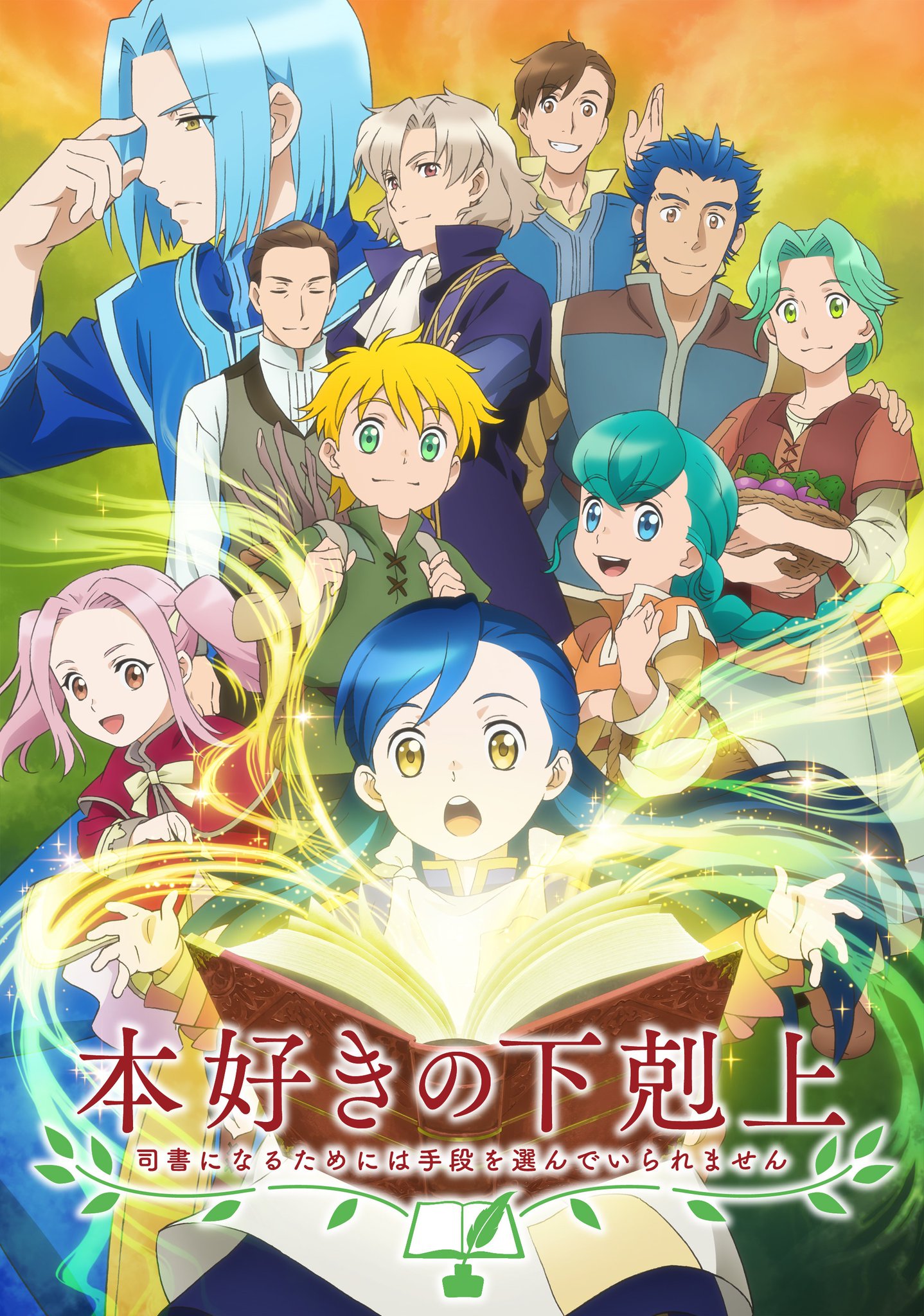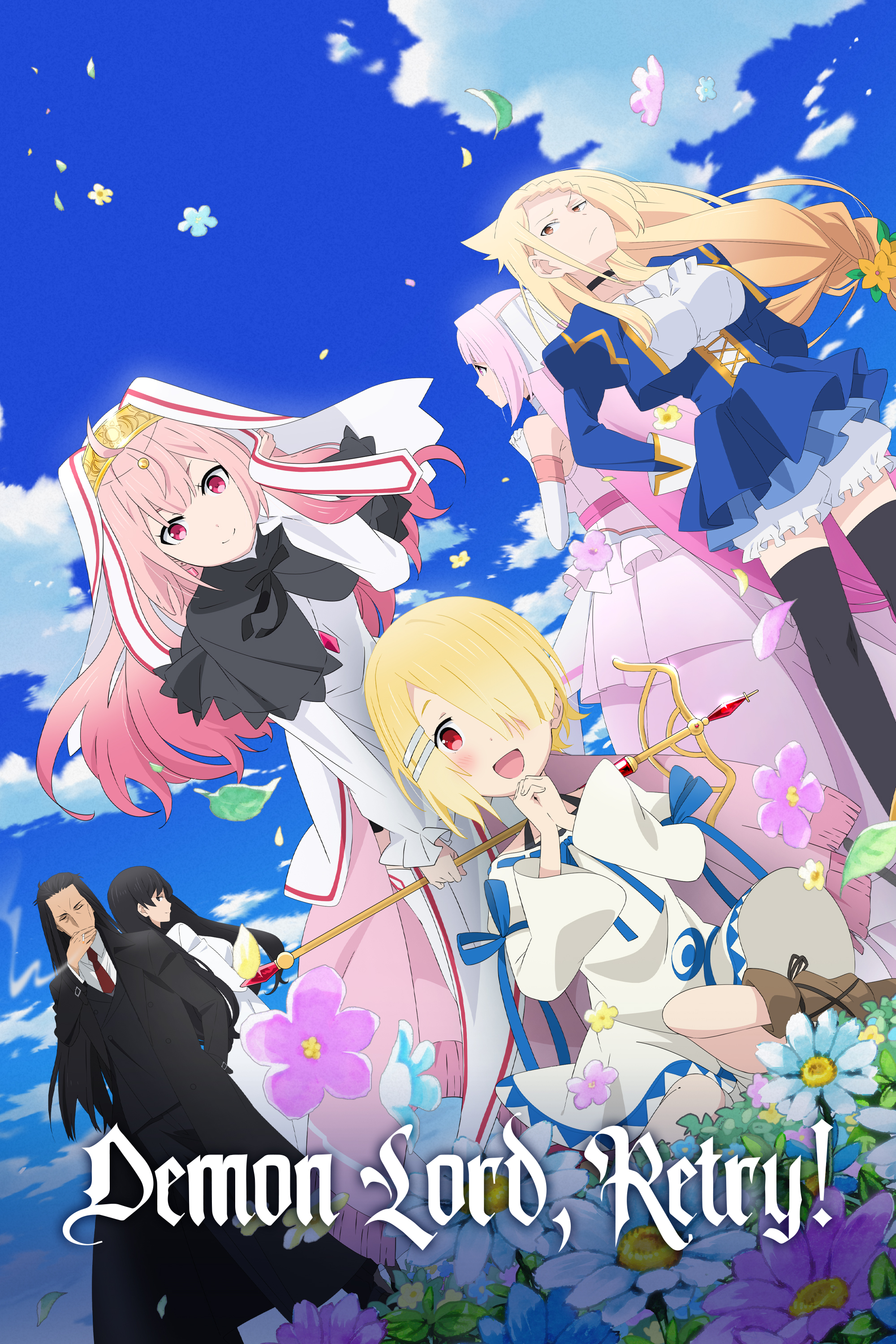Anime-BAWklog: Finished Series A-Z (Part II)
Greetings, Weebotaks! Welcome BAWk to the Anime-BAWklog, where I'm trying to clear the Anime-BAW clog in my brain one letter at a time. Last installment, I covered every title I could think of that I reviewed from A to C (plus a few numeric selections). Work and college prevented me from finishing this post in time for the last two AniMondays, and I apologize for not getting the social media announcements done in a timely fashion last time, either. But I've reached a point where I can comfortably bang this out without worry, so here goes, starting with a few A's that I neglected to mention last time:
Arte--This series just wrapped its dub release last week, and I enjoyed it enough to give it its due respect here. Arte is about a girl of noble birth living in Italy during the Renaissance period. Arte also happens to be that girl's name, as well as how you say what her passion is in Italian. Arte likes art. A lot. And she's great at it. Unfortunately, Renaissance-era Italian society don't take too kindly to noble women-folk what ain't good at all that stuff that chauvanists think noble women-folk ought to be good at. After watching her mother destroy the majority of her life's work because she would rather draw than cook, clean, marry rich, and get pregnant, Arte runs away from home with her remaining sketches, and tries to get an apprenticeship with a local workshop. Of course, being artsy is "men's work," so no one takes her seriously, except for a grumpy loner named Leo, who not only notices her talent, but also recognizes something of himself in her. You'd think at this point that the series writers would go, "oh! Woman working for man falls in love with him and sacrifices her dream so she can marry him and become exactly what her mother wanted her to be in the first place." And while Arte does address this as a very real possibility early on, it only addresses it, and rightly so (especially in this era of #metoo, and of female empowerment in general). The writers of Arte the series respect the fact that Arte the character would never do something like that, putting the struggle, the dream, personal strength, and character development in full focus. While the supporting characters' turns from deeply ingrained chauvanism to immediate awe, respect, and inclusion are a bit 90s sitcom-quick for reality's sake, the moments where Arte proves herself and/or catches the male cast off-guard are sure to inspire the audience for which they are intended, and to stir up some laughs across the board. There's even an arc towards the end involving Arte traveling to Venice to tutor a nobleman's...difficult...daughter, who gets some character development of her own as they both work to come to grips with their respective female- and nobility-related personal issues. Several series of this kind have incorporated such an arc into their runs (including the next A series I will discuss), but few get it as right or integrate it as smoothly into the main story so close to the series' end as Arte has. Though I thoroughly enjoyed Arte and understood who its target audience was and how they might be affected by it (despite not being a member of that half of the population), I can honestly say that there doesn't need to be another season. Arte's pursuit of her dream may be far from over, but her character development was wrapped up beautifully in the last episode, so I'm happy. I could spoil the finale for you, but I would be doing so only for my own remembrance, so go enjoy the ride for yourselves!
Ascendance of A Bookworm--This series wins the award for nerdiest isekai ever, and that's a good thing..or could have been. After dying in an avalanche of books at the local library, a girl wakes up in a medieval fantasy world in the body of a frail peasant girl named Main (pronounced "mine"). She inherits the girl's memories, but keeps her own memories and personality from her previous life in Japan, which means she's still madly obsessed with books. The problem: in this new world, only nobles and clergy know what books are! So in a superstition- and heavily class-based society, Main must overcome her new body's frailty and hide the fact that she's a completely different person by...constantly talking about books and randomly inventing simple modern conveniences from Japan that no one in her new world has ever heard of? And of course, her new body's family are totally supportive of her complete change in personality, compulsive quality of life improvements, obsession with making her own books...and her glowing, prismatic eyes and the Super-Saiyan aura she gets before passing out. Rather than immediately calling an exorcist, they go about their lives, letting Main make her inventions and start her own trade business, which catches the attention of a noble merchant's family, whose daughter has a similar condition to Main, termed "the Devouring." It's basically an auto-immune disease where the person's body gets destroyed by their own magical energy; AIDS crossed with spontaneous human combustion. And like AIDS, it has no known cure. But clergy and nobility have access to items that prolong a Devoured person's life by siphoning off their excess magic. So when the time comes for her older sister to get baptized, Main takes steps to join the church because not only will she get proper treatment for the Devouring, THE CHURCH HAS A LIBRARY!!!!!!!!!!!!!!!!!!!!!!! As Arte did in her series above, Main also must deal with prejudice and classism, and prove herself worthy of the opportunities she has been granted, eventually battling classism within the church itself (albeit for very selfish, sociopathic reasons--the possible deaths of starving, unbaptized orphans harshes her mellow when she's reading), which leads into Bookworm's "fight the system, but also teach unmanageable, bratty little kids how to conform to society" arc. It gets a bit fetch-questy (a.k.a. "I wonder what the cheese will want"), wasting time that could be better spent forwarding the plot, but progresses about as you'd expect such an arc to progress. And we meet a few interesting new characters along the way, including a music instructor (who's as obsessed with music as Main is with books) teaching Main how to play the opening bars of "Nothing Else Matters" by Metallica (???) and an androphobic nun with a history of sexual abuse. Perhaps this will be addressed in a future season, but as cool as the world-building and Main's displays of resourcefulness were, the combination of simple, cute character designs, syrupy voice acting, and the characters' uncharacteristic acceptance of what that world would view as demonic possession (not to mention the later inclusions of such dark topics as child abuse, hateful classism, and rape) don't mesh well with the atmosphere or the genre presented as their backdrop. So I'm not as compelled to watch a second season as I was to keep watching the episodes week-to-week.
And with that out of the way, we move on to the BAWklog proper, starting with:
Darwin's Game--The protagonist is drawn into a seedy underworld of super-powered sociopaths and likeable, desperate survivalists when a mobile game that his best friend messaged him about attacks him with a snake coming out of his phone, thereby marking him as the newest player of a techno-supernatural battle royale and giving him the ability to replicate any inanimate object he touches. After killing the invisible panda cosplayer that murdered his best friend, his abilities and idealism attract the attentions of a bloodthirsty socialite waifu who can psychically control chain-spikes like she's Dr. Octopus auditioning for a role in Attack on Titan, an information broker who can see fate, a Punisher wannabe with lie-detection powers, and a timid girl with hydrokinesis who is possessed by the spirit of her psychotic twin brother with ice powers. Together, they attempt to survive the titular death match by padding out the twelve-episode runtime with badass recruitment fights, character over-development, fetch quests, and starting their own clubhouse. And somewhere in there, they take a few minutes out of their "busy" schedules to fight the power and bring the noise. There is no talk of a second season (unpopular IP?), so Darwin's Game is just another "read our manga, senpai!" anime that did very little with so much.
The Demon Girl Next Door--A girl named Yuko has a strange dream about a succubus, and wakes up to find out that she's descended from a long line of powerful demons. Oh, and she has horns and a tail now, and everyone can see them, and everyone treats them as a completely normal occurrence. Whereas Bookworm took place in a world where accepting such things made no sense, Demon Girl Next Door is clearly a comedy from scene one. Not only that, the comedy comes first, successfully lending more weight (or insanity) to the serious moments as needed. Case in point: the mechanism that kicks off the main character dynamic of the series. Yuko learns from her mother that in order to lift the curse (a karma-induced budget!?) placed on her family, she has to kill a magical girl and feed her blood to their ancestors. The problem is that Yuko is hilariously weak, and Momo (the magical girl who lives next door to her) can stop a speeding semi truck with one hand. Of course, as a weak pacifist, Yuko could have just said, "screw thousands of years of prejudice," explained her family's situation, and asked Momo for some of her blood; problem solved, end of story. But then the end of the story would have also been the absence of a story. So instead, we get "scheme of the week" antics on Yuko's part as she discovers repeatedly that she's both too nice to be evil and too gullible to be strategic. This serves as a simple but effective comedic backdrop for an inadvertent friendship between the two mortal enemies, and uncovers some actual character depth, commentary on the ills of historically-ingrained prejudice, and a decently concocted story explanation for "why can't she just ask Momo for blood?" If you're expecting a magical-girl-versus-demon-girl fight to the death, prepare for disappointment; but if you accept Demon Girl Next Door for the stupid, funny, seemingly disposable watch that it is, then you may be surprised at its depth, heart, and intelligence.
Demon Lord Retry--One of three Demon Lord-centric isekai series to come out in the last two years (the others being How Not to Summon A Demon Lord and Overlord). It's your usual, "human gamer with overpowered character gets sucked into his favorite game as said character and makes with the modernization and badassery" plot. But where its contemporaries lean hard into anti-hero and villain territory, this Demon Lord sees that the world he created in the game was a hellish dystopia, and aims to subvert the expectations of those around him (including three sister-priestesses and his sadistic lady-doctor sidekick, who think his every thought and action hides sinister ulterior motives) by using his power, resources, and alternative avatars to protect the innocent, expand his social circle, and...build the Playboy mansion? I joke, but he built a hotspring resort-slash-hospital and staffed it with bunny-girls, so yeah...basically the Playboy mansion. I hate to keep saying this, but "blah-blah recruitment, blah-blah fetch quests, blah-blah good comedy, blah-blah potential, blah-blah cliffhanger, blah-blah no second season yet, blah-blah read the manga, blah-blah entertaining waste of time, [insert mean, title-related pun here], moving on."
Didn't I Say to Make My Abilities Average In the Next Life?--With so many isekai series trying to be the next, last, possibly next big isekai series, I don't see this getting another season, so I'll call it finished for now. As I warned you last time, any anime with a title this long was a light novel in its previous life, and with a title this long, it's also the plot. A Japanese otaku girl is run down while saving someone from being hit by a truck, and gets reincarnated into a fantasy world. The hook is that because being exceptional and nerdy made her old life suck, she asked the god of the fantasy world to just make her average in every way, which the god takes in the literal, mathematical sense. And because the new world has dragons who are slightly weaker than a god, the girl ends up as your typical, overpowered isekai protagonist. And because the fantasy world is also part video game--maybe?--magic is just tiny, artificially intelligent robots who manifest as a cute animal mascot that only she can see, because being reincarnated with half the midichlorian count of a dragon-god does that? Okay, so with those mechanics in place, our heroine spends the majority of the plot trying to hide the fact that she was reincarnated from Japan with enough "magic" power to nuke a small country by...joining an adventuring party, blowing up monsters, and turning her new friends (basically Megumin from Konosuba but with character development, basically German Mulan, and basically Aqua from Konosuba but competent and not annoying) into Japanese nerds? Ancient family secret, my ass! That makes about as much sense as Superman vowing to keep his identity a secret by fighting crime dressed as Clark Kent. Luckily, our heroines are "pair of glasses = completely different person" stupid, so DISMMAAINL quickly turns into the BOFURI of isekai, letting party building mechanics, cute girls' club comedy, and monster-of-the-week action have free run of most of the episodes. But didn't I say this anime was average and probably wouldn't get another season? Just when I thought my time was going to be wasted, another routine adventuring quest turned into one of the coolest world-building twists ever, making me want to see the story continue.
Double Decker: Doug & Kirill--Underdog rookie cop Kirill stumbles upon a high-profile crime in progress and finds himself partnered with Doug, a.k.a. “Veteran,” a, um, veteran cop who is part of a secret police squad. Their purpose: hunt down and use special serum-filled bullets to capture, cure, or kill criminals who have drug-induced superpowers. From the jump, the visuals are awesome, and the characters are brimming over with quirk and personality. However, the two main characters are impossibly incompetent, their boss is a self-important, ego-blinded moron, and the narrator is the kind of obnoxiously insensitive, annoying character you’d find populating the entire cast of a bad Will Ferrell movie. Two episodes was almost more than enough.
Durarara! (x2)--Right up front, this is a great anime. It’s a slice-of-night-life/supernatural/action/drama series that follows multiple interesting characters in parallel, including three close friends who nonetheless keep powerful secrets from one another, a super-strong bartender, a trio of “well-meaning” kidnappers, a creepy information broker (voiced by Johnny Yong Bosch of Power Rangers and Bleach fame), numerous stalkers, serial killers, criminal organizations, assassins, and mad scientists, a black Russian who runs a sushi restaurant, and a headless Nordic folk spirit who rides a motorcycle and wears a biker ensemble made out of black smoke. Though slow to start and ambitious to the point of sometimes being outright confusing, Durarara! and its three-part sequel series stand tall on the shoulders of this charismatic and intriguing cast and a host of references to other popular anime and manga properties (including Sword Art Online and the previously applauded Spice and Wolf). If you have the time and brain power to devote to what is basically Japan’s (successful) attempt at Lost-level storytelling in a large, bustling city, then check out Durarara!
I was going to put more reviews here, but the post was getting long and I need to start spacing things out so I can have a decent release schedule going forward. Also, I need to start work on my script for a live action Space Dandy film starring Jim Carrey and Nicolas Cage.
Ticketmaster,
Just Kidding!













Comments
Post a Comment